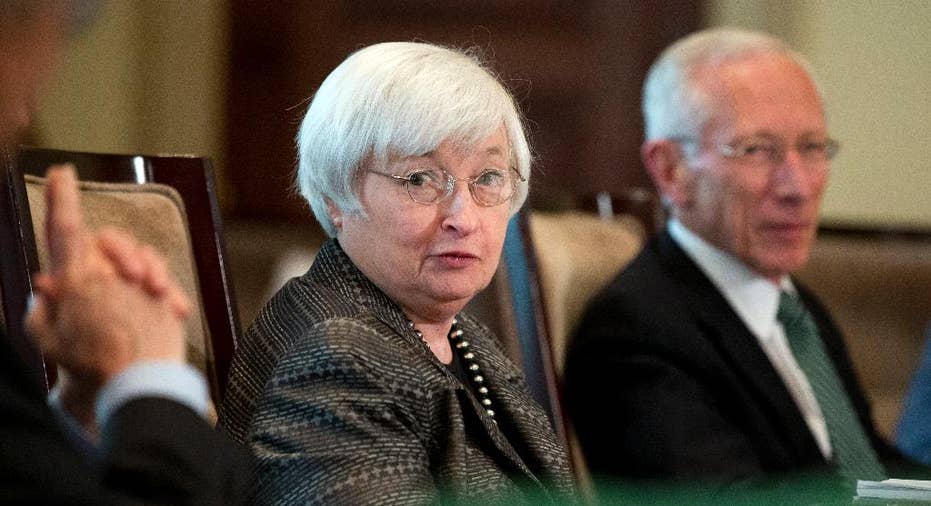Even as Fed edges toward a rate increase, here are 5 factors that could forestall a Sept. hike

WASHINGTON – Thanks to a strengthening U.S. economy, four weeks from now the Federal Reserve is widely expected to engineer its first interest rate hike in nearly a decade. Rates on loans throughout the economy could eventually rise as well.
But the minutes of the Fed's July meeting, released Wednesday, sent another message, too: A variety of lingering concerns could derail the Fed's timetable between now and then.
A big problem is that the Fed is on target to achieve only one of its dual goals: Maximizing employment. Job growth has been consistently strong. And the unemployment rate has reached a seven-year low of 5.3 percent.
But the central bank is way off on its other priority: Keeping inflation at an average level of 2 percent a year. For more than three years, inflation has been running well below that target. When inflation remains too low, many people postpone purchases and collectively slow consumer spending, the economy's main fuel. Too-low inflation also makes the inflation-adjusted cost of loans more expensive.
Here's a look at five factors that potentially could cause the Fed to wait beyond its Sept. 16-17 meeting to start raising rates.
RISING DOLLAR
The dollar has been rising in value for much of the past year, reflecting economic weakness overseas and expectations that U.S. Treasury rates will climb once the Fed starts raising rates. The trouble is that a stronger dollar makes it harder for the Fed to raise inflation. Why? Because imported goods become cheaper as the dollar's value rises. A stronger dollar also dampens economic growth as U.S. exports suffer.
CHINA'S TROUBLES
The minutes of the Fed's July 28-29 meeting showed that officials were concerned about developments in China. They felt assured that the plunge in China's stock market in the weeks before their meeting had had only a limited effect on China's growth prospects. But "several participants" worried that a sharp slowdown in the Chinese economy would imperil the U.S. economic outlook.
There was also concern that a divergence in rates between the United States and foreign countries could further strengthen the dollar as investors move money into higher-rate U.S. securities.
And since that meeting, the picture has worsened: China last week devalued its own currency. That move, seen in part as an effort to boost Chinese exports, sent shockwaves through global markets because it raised concerns that China was facing bleaker economic risks than investors had realized. And a weaker yuan would mean further upward pressure on the dollar, thereby widening America's already huge trade gap with China.
LABOR DIP
While the U.S. job market has been steaming along with strong job growth, the minutes showed that some Fed officials still worry that the labor market isn't healthy enough. These officials, according to the minutes, expressed concerns that there were still many discouraged workers who have stopped looking for a job and still-high levels of workers being forced to work part time compared with before the Great Recession.
If the August jobs report, the last one the Fed will see before its September meeting, suggests a weaker labor market, the central bank could decide to postpone any rate hike.
INFLATION MISS
It isn't just the strong dollar that raises concern about low inflation. Oil prices have resumed falling, with U.S. crude dropping nearly $2 a barrel to $41.17 in electronic trading on the New York Mercantile Exchange on Wednesday.
Many analysts say the prospect of a greater global oil supply if nuclear sanctions are lifted on Iran could keep prices down. That would be a boon for U.S. motorists. But it would also mean an even bigger miss for the Fed in its effort to lift inflation back up to 2 percent. The Fed has said it won't raise rates until it's "reasonably confident" inflation will move back toward its target.
GOVERNMENT SHUTDOWN?
Congress returns from its August recess next month with a long to-do list, including passing a budget by Oct. 1 for the start of the new budget year and raising the nation's borrowing limit to avoid a default on the national debt. It was the prospect of a government shutdown and standoff over the debt limit in 2013 that led the Fed to delay a cutback in its bond purchases. Those purchases were intended to keep long-term borrowing rates down.
Some economists think the Fed may be concerned enough about how another budget stalemate could depress market confidence that it would put off a September rate hike.
Diane Swonk, chief economist at Mesirow Financial, said she still expects the Fed to raise rates in September. But she said the list of concerns is long enough that it might give Fed officials reason to delay.
"The bet is still that they achieve liftoff in September," Swonk said in a research note. "However, Fed officials need to telegraph that soon if they actually intend to do so."



















